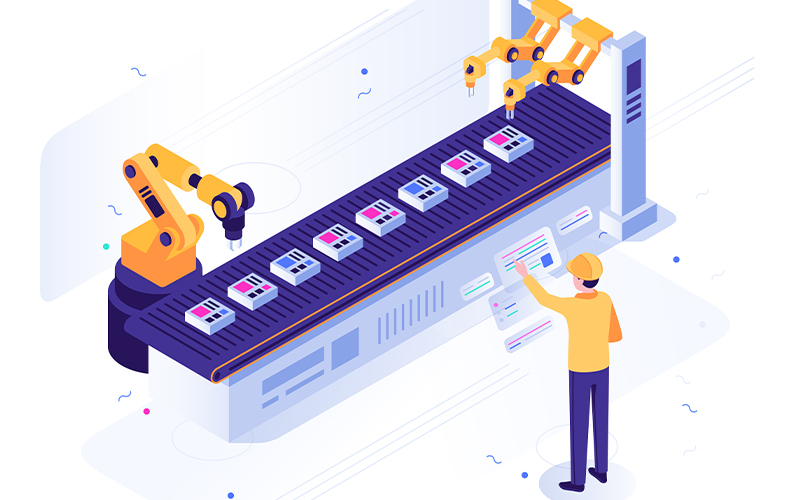Retail, CPG and Logistics
Key role of data and personalisation in e-commerce
“Innovation, personalisation critical to growth of digital businesses: Industry leaders at E-Commerce and Digital Natives Summit 2022” read the headlines of a news article carried by Retail Economic Times earlier this month (Sep 2022).
The article moved on to quote two top-level executives: “Today customers want support anytime and anywhere in a consistent, seamless and hyper-personalised manner” and “personalisation is a must-have for omnichannel play in retail”.
This underlines the importance of personalising e-commerce.
E-commerce personalisation drives sales
E-commerce personalisation is about online commerce platforms delivering experiences that, apart from being relevant, are customised to each consumer. You must be familiar with these names — Amazon and Netflix — in connection with personalisation. As a result, the personalised customer experience they deliver is unparalleled.
Take for example Amazon's “Recommended for you” or “Customers who bought” widgets. They are said to drive nearly 35 percent of Amazon's sales with nearly 56 per cent of customers likely to return for more purchases. Global statistics also show that content personalisation can enhance user experience, boost conversion rates and increase sales by about 20 per cent.
By now, there is no doubt as to the vital role that personalisation plays in improving the company’s bottom line. The question is, how is it able to do this for businesses?
Big data and Artificial Intelligence (AI) key contributors
Personalisation drives sales and big data powers personalisation. Big data is like God, all-pervading. Every touchpoint with a business – website, mobile devices, in-store transactions and others – leads to generation of data.
Enterprises, particularly digital marketers have long known how valuable the currency of data can be. The use of information to steer sales upwards has always been a strategy that marketers have used for years, but the act of putting information to use usually took years to come to fruition. Now, the availability of powerful digital tools such as big data analytics and AI have made market research analysis a matter of days, even hours.
What are the most effective ways in which to use these potent tools for e-commerce personalisation?
- Developing an all-round view of the customer What is the one critical thing needed to “tailor” a perfect-fit? It is taking a good “measure”. This is what big-data helps you do. It allows you to “befriend” a customer and know details about the individual – such as age, gender, preferences, etc. – that matter in delivering a customised experience. From where does it collect the information? The sources are plenty – website cookies, social media platforms, customer’s transaction history are just a few of them.
- Delivering dynamic web pages How to use the information gathered about a customer, existing or prospective? A logical step would be to apply the knowledge to customise your website to show information that the customer may want to see and is relevant to him/her. There are many avatars that personalising content can take, for example, abandoned cart reminders, “pick up where you left off” widgets, Facebook’s news feed display and many such.
- Preparing recommendation widgets Don’t we all find Netflix’s “recommended movies” a convenient gimmick to browse through movies that might hold our interest? Well, studies have shown that 92 per cent of consumers are highly persuaded by these suggestions. Recommendation engines are a prominent application of big-data analytics in the area of personalisation. By integrating inventory and logistics data and uncovering hidden dependencies, analytical tools make recommendation engines highly efficient in delivering customised user experience.
- Boosting customer care experience
One way to encourage repeat business is by letting customers know that they are heard and cared for. 90 percent of people don’t want to do business with companies who have let them down in customer-services. The unfortunate part of it is that most people prefer just walking away rather than complaining. Therefore, a big-data driven customer relationship management (CRM) solution is a worthwhile investment.
Key Takeaways on Data-Driven Personalization for E-commerce
There is no one mantra to ace e-commerce personalisation or how big data can be leveraged to deliver a great customised user experience. This is a continuous process, but marketers must remember that the ultimate purpose is to increase profitability for the company.
In the current digital era, we have the means to understand customer needs and his/her pain points. The challenge is to use the digital tools at our disposal to address them in a creative way. With the stiff competition in the online marketplace, the best bet for businesses is to harness the data being collected and translate it into actionable insights, allowing customers to have a hyper-personalised experience constantly. Are your teams set up to sustain and optimise this critical information cycle?
*For organizations on the digital transformation journey, agility is key in responding to a rapidly changing technology and business landscape. Now more than ever, it is crucial to deliver and exceed on organizational expectations with a robust digital mindset backed by innovation. Enabling businesses to sense, learn, respond, and evolve like a living organism, will be imperative for business excellence going forward. A comprehensive, yet modular suite of services is doing exactly that. Equipping organizations with intuitive decision-making automatically at scale, actionable insights based on real-time solutions, anytime/anywhere experience, and in-depth data visibility across functions leading to hyper-productivity, Live Enterprise is building connected organizations that are innovating collaboratively for the future.






